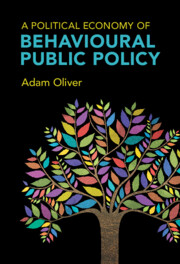Book contents
- A Political Economy of Behavioural Public Policy
- A Political Economy of Behavioural Public Policy
- Copyright page
- Dedication
- Contents
- Illustrations
- Preface
- Acknowledgements
- Introduction
- 1 Setting the Scene
- 2 Other Voices
- 3 A Kingdom of Ends
- 4 The View from Nowhere
- 5 Nourishing Flourishing
- 6 Anyone for Desert?
- 7 Private Matters
- 8 Public Matters
- 9 The Lives of Others
- 10 Summing Up
- Notes
- References
- Index
2 - Other Voices
Published online by Cambridge University Press: 16 February 2023
- A Political Economy of Behavioural Public Policy
- A Political Economy of Behavioural Public Policy
- Copyright page
- Dedication
- Contents
- Illustrations
- Preface
- Acknowledgements
- Introduction
- 1 Setting the Scene
- 2 Other Voices
- 3 A Kingdom of Ends
- 4 The View from Nowhere
- 5 Nourishing Flourishing
- 6 Anyone for Desert?
- 7 Private Matters
- 8 Public Matters
- 9 The Lives of Others
- 10 Summing Up
- Notes
- References
- Index
Summary
To serve as reference comparators to the political economy of behavioural public policy that I will present in the rest of the book, I will review the principal alternative (partial) frameworks that have been introduced into the field of behavioural public policy. I present the conceptual requirements of the most influential approach to date - i.e. libertarian paternalism, applications of which are known as nudges. I move on to several of the alternative frameworks that have been developed to meet major criticisms that have been waged against nudges - namely coercive paternalism (or shove policy), and the nudge-plus and boost strategies. All of these approaches aim at correcting perceived behavioural limitations on the demand side. I then introduce a framework that instead attempts to tackle the egoistic exploitation of the behavioural influences from the supply side - i.e. behavioural regulation, or the so-called budge approach. However, since budges are one of the two main arms of my political economy of behavioural public policy, a large part of a whole chapter (Chapter 9) is devoted to them, and thus their consideration in this chapter is quite brief.
- Type
- Chapter
- Information
- A Political Economy of Behavioural Public Policy , pp. 26 - 40Publisher: Cambridge University PressPrint publication year: 2023

